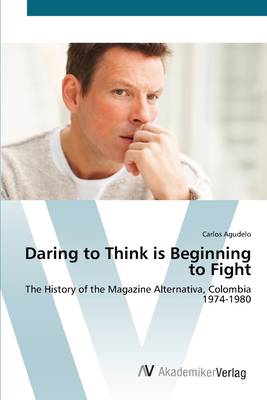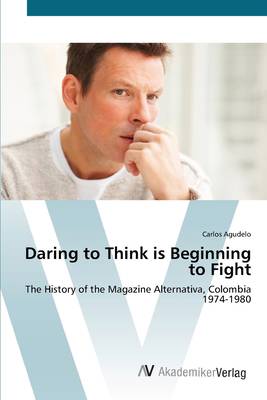
Bedankt voor het vertrouwen het afgelopen jaar! Om jou te bedanken bieden we GRATIS verzending (in België) aan op alles gedurende de hele maand januari.
- Afhalen na 1 uur in een winkel met voorraad
- In januari gratis thuislevering in België
- Ruim aanbod met 7 miljoen producten
Bedankt voor het vertrouwen het afgelopen jaar! Om jou te bedanken bieden we GRATIS verzending (in België) aan op alles gedurende de hele maand januari.
- Afhalen na 1 uur in een winkel met voorraad
- In januari gratis thuislevering in België
- Ruim aanbod met 7 miljoen producten
Zoeken
Daring to Think is Beginning to Fight
The History of the Magazine Alternativa, Colombia 1974-1980
Carlos Agudelo
Paperback | Engels
€ 68,45
+ 136 punten
Omschrijving
Revision with unchanged content. This case study of leftist journalism in Latin America defines the charac teristics, in specific historical circumstances, of Alternativa, a magazine pu blished in Colombia from 1974 to 1980. The model was based on four ob jectives counter-informing; doing investigation, analysis and interpretation; divulging the struggles of the people; and propitiating the unity of the left with the ultimate goal of bringing revolutionary change to the country. The Marxists background of its founders, which included Nobel Prize winner Gabriel García Márquez, determined the magazine s content and an initially independent and neutral approach toward the left parties, while reaching a wide mass-circulation readership. Principled political differences led the magazine to several crises that fostered its journalistic evolution, probing the limits of press freedom in its struggle to survive against a reckless and corrupt regime. The narrative reviews the history of the country as it was portrayed in the publication, contrasting it with that of the establishment s media; it highlights paramount issues such as human rights violations, corruption and the role of the press, through the coverage of Colombia s armed forces and police; and it explores the magazine s complex relationship with the left, which eventually led to its demise.
Specificaties
Betrokkenen
- Auteur(s):
- Uitgeverij:
Inhoud
- Aantal bladzijden:
- 292
- Taal:
- Engels
Eigenschappen
- Productcode (EAN):
- 9783639421590
- Verschijningsdatum:
- 1/06/2012
- Uitvoering:
- Paperback
- Afmetingen:
- 152 mm x 220 mm
- Gewicht:
- 431 g

Alleen bij Standaard Boekhandel
+ 136 punten op je klantenkaart van Standaard Boekhandel
Beoordelingen
We publiceren alleen reviews die voldoen aan de voorwaarden voor reviews. Bekijk onze voorwaarden voor reviews.









